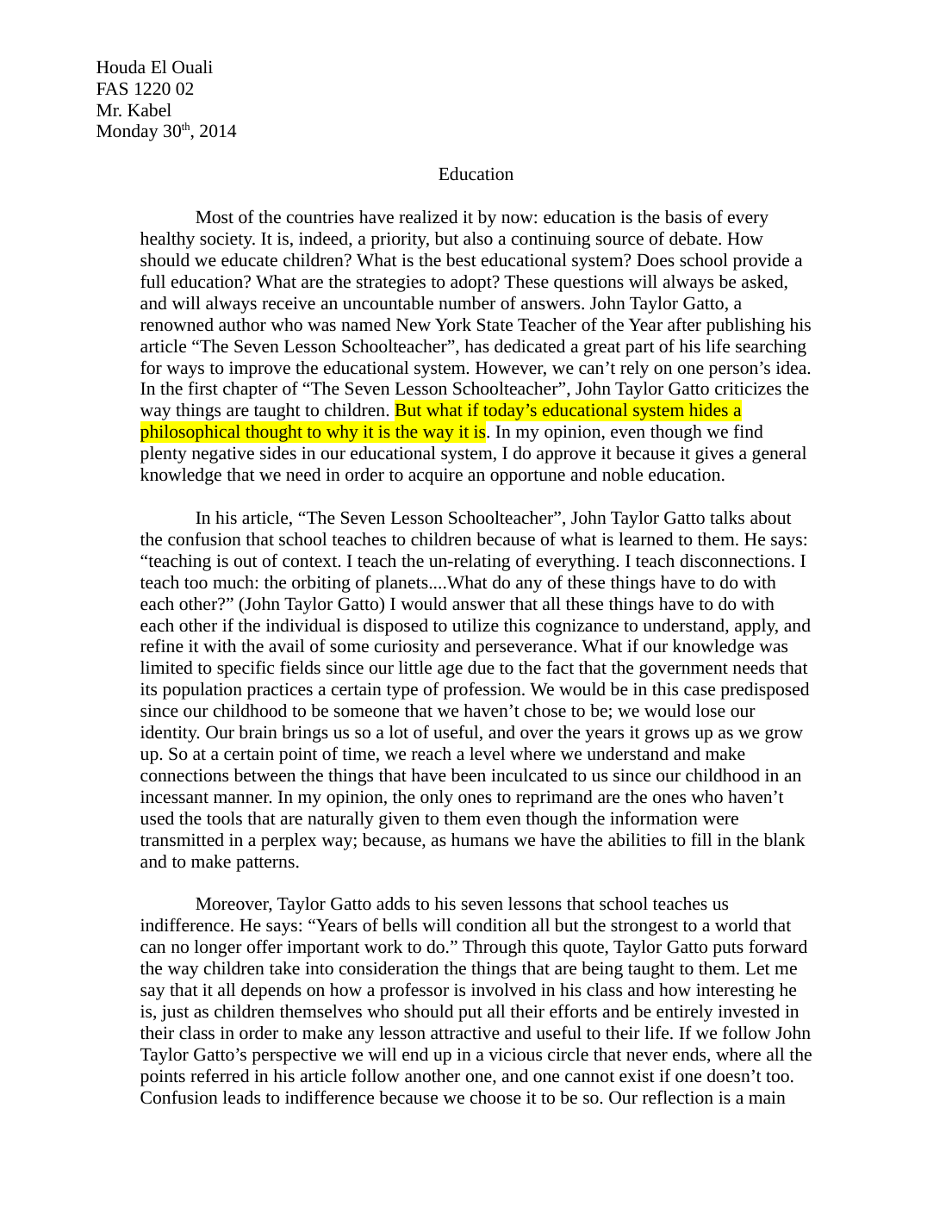l'education
Publié le 23/05/2020
Extrait du document
«
Houda El Ouali
FAS 1220 02
Mr.
Kabel
Monday 30 th
, 2014
Education
Most of the countries have realized it by now: education is the basis of every
healthy society.
It is, indeed, a priority, but also a continuing source of debate.
How
should we educate children? What is the best educational system? Does school provide a
full education? What are the strategies to adopt? These questions will always be asked,
and will always receive an uncountable number of answers.
John Taylor Gatto, a
renowned author who was named New York State Teacher of the Year after publishing his
article “The Seven Lesson Schoolteacher”, has dedicated a great part of his life searching
for ways to improve the educational system.
However, we can’t rely on one person’s idea.
In the first chapter of “The Seven Lesson Schoolteacher”, John Taylor Gatto criticizes the
way things are taught to children.
But what if today’s educational system hides a
philosophical thought to why it is the way it is .
In my opinion, even though we find
plenty negative sides in our educational system, I do approve it because it gives a general
knowledge that we need in order to acquire an opportune and noble education.
In his article, “The Seven Lesson Schoolteacher”, John Taylor Gatto talks about
the confusion that school teaches to children because of what is learned to them.
He says:
“teaching is out of context.
I teach the un-relating of everything.
I teach disconnections.
I
teach too much: the orbiting of planets....What do any of these things have to do with
each other?” (John Taylor Gatto) I would answer that all these things have to do with
each other if the individual is disposed to utilize this cognizance to understand, apply, and
refine it with the avail of some curiosity and perseverance.
What if our knowledge was
limited to specific fields since our little age due to the fact that the government needs that
its population practices a certain type of profession.
We would be in this case predisposed
since our childhood to be someone that we haven’t chose to be; we would lose our
identity.
Our brain brings us so a lot of useful, and over the years it grows up as we grow
up.
So at a certain point of time, we reach a level where we understand and make
connections between the things that have been inculcated to us since our childhood in an
incessant manner.
In my opinion, the only ones to reprimand are the ones who haven’t
used the tools that are naturally given to them even though the information were
transmitted in a perplex way; because, as humans we have the abilities to fill in the blank
and to make patterns.
Moreover, Taylor Gatto adds to his seven lessons that school teaches us
indifference.
He says: “Years of bells will condition all but the strongest to a world that
can no longer offer important work to do.” Through this quote, Taylor Gatto puts forward
the way children take into consideration the things that are being taught to them.
Let me
say that it all depends on how a professor is involved in his class and how interesting he
is, just as children themselves who should put all their efforts and be entirely invested in
their class in order to make any lesson attractive and useful to their life.
If we follow John
Taylor Gatto’s perspective we will end up in a vicious circle that never ends, where all the
points referred in his article follow another one, and one cannot exist if one doesn’t too.
Confusion leads to indifference because we choose it to be so.
Our reflection is a main.
»
↓↓↓ APERÇU DU DOCUMENT ↓↓↓
Liens utiles
- Commentaire d'un extrait de l'Education sentimentale de Flaubert ( Partie II, chap 6)
- is education for all
- Education
- Education Cost
- Carnet de lecturesRéférence : Document d'application des programmes - Littérature Cycle 3 ; collection école ;Ministère de l'Education nationale (DESCO) ; édition SCÉRÉNPage 12 : « On évitera de faire rédiger des « fiches de lecture ».

































